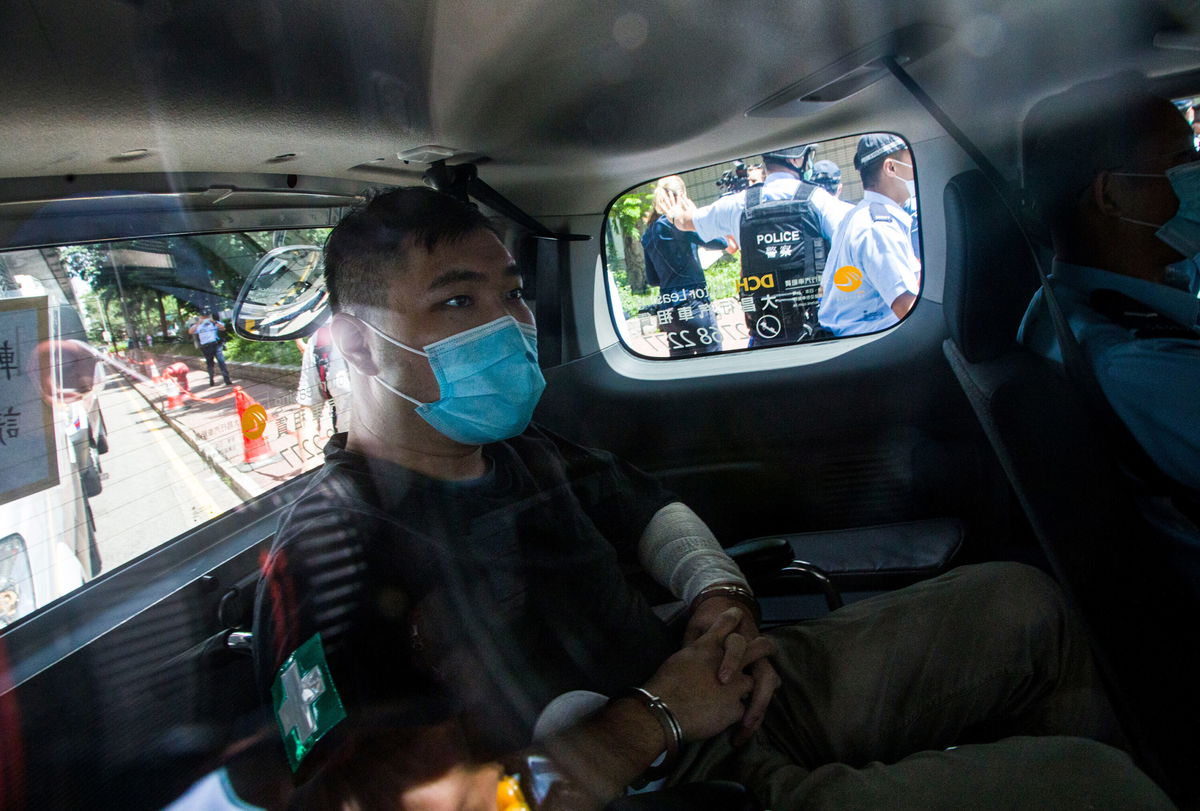First person charged under Hong Kong’s national security law sentenced to 9 years in prison

Tong Ying-Kit arriving in court on July 6
By Jessie Yeung and Chermaine Lee, CNN
The first person charged and convicted under Hong Kong’s national security law was sentenced to nine years in prison on Friday, setting a likely precedent for how future cases will be tried.
Tong Ying-kit, 24, received a six-and-a-half-year prison term for the charge of incitement to secession for carrying a large black banner emblazoned with the popular anti-government protest slogan, “Liberate Hong Kong, revolution of our times.”
He was also given eight years for committing terrorist activities, for crashing his motorcycle into a group of police officers last year, injuring three. Of these, 2.5 years will run consecutively, resulting in a total term of nine years.
The national security law, which was promulgated by Beijing on June 30 last year, criminalizes acts of secession, subversion, terrorism, and collusion with foreign forces. All carry a maximum sentence of life in prison.
As the sentencing was read out, some of Tong’s supporters in the public gallery shed tears while others offered encouragement, telling him to “hang in there,” to which Tong replied, “you guys also hang in there too.”
Speaking outside the court, Tong’s defense lawyer Clive Grossman said his client would appeal both the sentence and the verdict.
Tong’s defense lawyers had previously asked for the minimum sentence of three years, arguing that Tong had been reckless but did not deliberately mean to crash into police, and that he had shown remorse for his actions.
However, in the conviction ruling on Tuesday, the three judges — handpicked by the city’s leader to oversee national security cases — ruled that Tong’s actions had caused “great harm to the society,” and posed a “deliberate challenge to the police.”
An alternative charge of dangerous driving causing grievous bodily harm was not considered.
Much of Tong’s 15-day trial had hinged on the judge’s interpretation of the protest flag he was carrying, with the prosecution and defense arguing over the semantics, history and context of the banner’s slogan — a common rallying call during the pro-democracy, anti-government protests of 2019.
On Tuesday, the judges made clear the slogan was “intended to communicate secessionist meaning” and was “capable of inciting others to commit secession,” potentially laying the groundwork for future convictions related to the former mass protest movement.
A test case
As the first trial under the new legislation, Tong’s case has been widely viewed as a litmus test for how the law will be implemented in court in the coming months.
Tong had pleaded not guilty to all charges, which stemmed from an incident on July 1, 2020, just one day after the law was enacted. Tong was denied bail and his trial held without a jury, in a significant departure from the common law traditions that Hong Kong’s legal system had previously followed.
As of Monday, police have arrested 138 people and charged 76 under the law. Those arrested include students, activists, former lawmakers, journalists, and lawyers.
The Hong Kong government has repeatedly denied that the law’s vague parameters have been used to censor free speech or stifle political dissent. Carrie Lam, the city’s leader, has defended the law as a “crucial step to ending the chaos and violence” of the 2019 protest movement and ensuring “long-term stability and prosperity in Hong Kong.”
Rights groups and legal experts have criticized Tong’s conviction, however, arguing that it has laid the groundwork for further criminalizing forms of free speech. “I don’t want to lose sight of the individual, but so much of this, of course, is about the potential chilling effect going forward, in what is already a very frigid atmosphere,” said Maggie Lewis, a Taiwan-based law professor for Seton Hall University.
According to Lewis, Tong’s sentence was not about how “tolerant or restrictive” authorities would be under the security law, but rather more “a question of emphasis” in providing an example to the public.
In many ways, the message had already been sent with Tong’s conviction Tuesday, said Lewis.
“In reading the judgment, the court did not leave guardrails as far as clarifying some safe space for expressing political opinions that are different from that of the Hong Kong government and Beijing,” said Lewis.
“That’s now part of the fabric of understanding the national security law. This is not something that is done in isolation, it’s now going to be put on a shelf, it will be referenced by lawyers (and the general public),” she added.
The-CNN-Wire
™ & © 2021 Cable News Network, Inc., a WarnerMedia Company. All rights reserved.